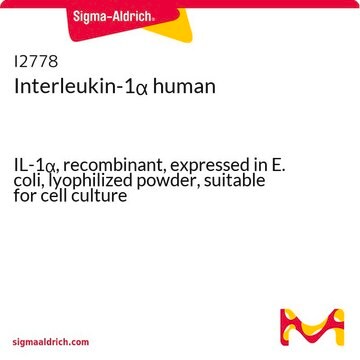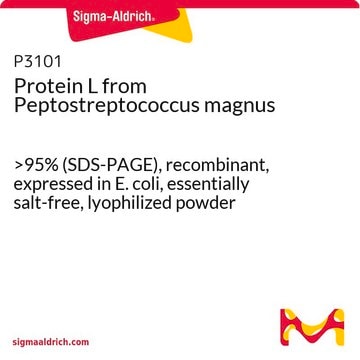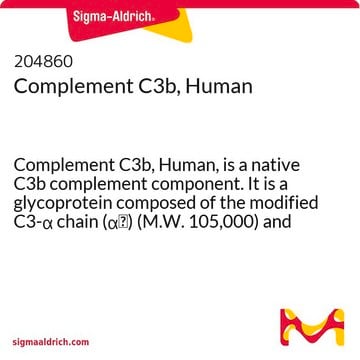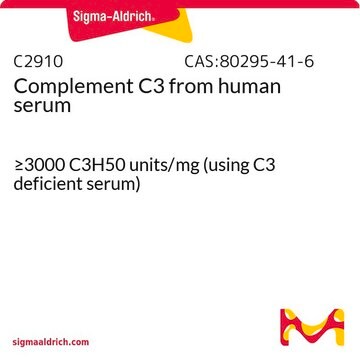204876
Complement C1q, Human
Complement C1q, Human, CAS 80295-33-6, is a native C1q complement component composed of 18 polypeptide chains consisting of three nonidentical A, B, C subunits of 29, 26, and 19 kDa, respectively.
Synonym(s):
Complement C1q, Human
Sign Into View Organizational & Contract Pricing
All Photos(1)
About This Item
Recommended Products
Quality Level
Assay
≥90% (SDS-PAGE)
form
liquid
manufacturer/tradename
Calbiochem®
storage condition
OK to freeze
avoid repeated freeze/thaw cycles
impurities
IgG, IgA, IgM, C3, C4, albumin, fibrinogen, α₂-macroglobulin, trace
shipped in
wet ice
storage temp.
−70°C
General description
Native, human C1q complement component. Glycoprotein composed of 18 polypeptide chains consisting of three nonidentical subunits A, B, and C, of M.W. 29,000, 26,000 and 19,000, respectively. Present in normal human serum at 70 µg/ml. Found in circulating blood plasma complexed with two C1r and two C1s molecules to form the first component of complement (C1). Activation of complement via classical pathway is triggered by binding of C1q to immune complexes containing IgG or IgM or to a variety of other activating substances, including C-reactive protein, retroviruses, and mitochondria. Subsequent to C1q binding, C1r and C1s are converted to proteolytic enzymes that are responsible for continuation of activation via the classical pathway.
Native, human C1q complement component. Glycoprotein composed of 18 polypeptide chains consisting of three nonidentical subunits, A, B, and C, of M.W. 29 kDa, 26 kDa, and 19 kDa, respectively. Present in normal human serum at 70 µg/ml. Found in circulating blood plasma complexed with two C1r and two C1s molecules to form the first component of complement (C1). Activation of complement via classical pathway is triggered by binding of C1q to immune complexes containing IgG or IgM or to a variety of other activating substances, including C-reactive protein, retroviruses, and mitochondria. Subsequent to C1q binding, C1r and C1s are converted to proteolytic enzymes that are responsible for continuation of activation via the classical pathway.
Biochem/physiol Actions
≥150,000 C1qH50 units/mg and ≥70% C1q activity in normal human serum on a mg/mg basis
Packaging
Please refer to vial label for lot-specific concentration.
Warning
Toxicity: Standard Handling (A)
Physical form
In 300 mM NaCl, 10 mM HEPES, 40% glycerol, pH 7.2.
Preparation Note
Prepared from serum that has been shown by certified tests to be negative for HBsAg and for antibodies to HIV and HCV.
Reconstitution
Following initial thaw, aliquot and freeze (-70°C).
Other Notes
Loos, M., et al. 1980. J. Immunol. 124, 59.
Kolb, W.P., et al. 1979. J. Immunol. 122, 2103.
Kolb, W.P., et al. 1979. J. Immunol. 122, 2103.
Legal Information
CALBIOCHEM is a registered trademark of Merck KGaA, Darmstadt, Germany
Storage Class Code
10 - Combustible liquids
WGK
WGK 2
Certificates of Analysis (COA)
Search for Certificates of Analysis (COA) by entering the products Lot/Batch Number. Lot and Batch Numbers can be found on a product’s label following the words ‘Lot’ or ‘Batch’.
Already Own This Product?
Find documentation for the products that you have recently purchased in the Document Library.
Customers Also Viewed
Our team of scientists has experience in all areas of research including Life Science, Material Science, Chemical Synthesis, Chromatography, Analytical and many others.
Contact Technical Service












